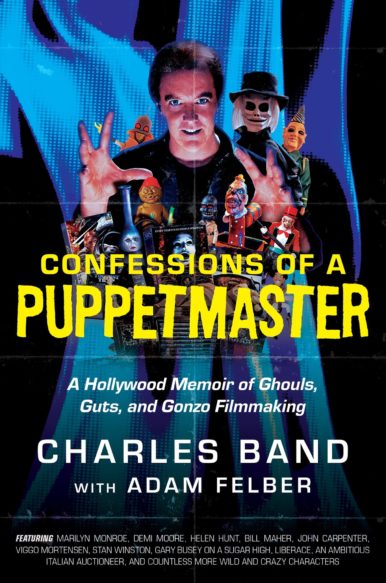By CHARLES BAND, ADAM FELBER (William Morrow; 2021)
Seeing the veteran B-movie director/studio head Charles Band speaking at horror conventions and in the “video zone” featurettes that appeared on Full Moon VHS releases (see below), the impression given was of a hyperactive teenager.
Reading CONFESSIONS OF A PUPPETMASTER: A HOLLYWOOD MEMOIR OF GHOULS, GUTS, AND GONZO FILMMAKING, the now 69-year-old Band’s long-in-coming memoir, that impression is confirmed, with a voice, attitude and attention span that come off as somewhat less-than-mature.
…a voice, attitude and attention span that come off as somewhat-less-than mature.
In this book the irrepressible Band recounts a wild existence that started in Italy, where his first brush with filmmaking was as a child actor in the flick THE AVENGER (1962), produced by his filmmaker father Albert Band. Another formative experience was a nightmarish stay in a third world hospital due to appendicitis, where Band learned that “I could live through absolutely anything.” Undaunted, he (illegally) set up a nightclub at age fifteen that was shut down by authorities, thus setting the tone for Band’s future endeavors, which tended to be impulse-driven and short-lived.
In this book the irrepressible Band recounts a wild existence that started in Italy, where his first brush with filmmaking was as a child actor in the flick THE AVENGER (1962), produced by his filmmaker father Richard Band.
Those endeavors included a publishing business predicated on a New York Times collection Band purchased from an ad in the Village Voice, followed by a pioneering video cassette outfit (the outgrowth of a video bootlegging scheme Band had going with Roddy McDowell) in the form of Meda (later Media) Video, and Wizard Video, which specialized in creating snazzy box art for videos that were manufactured elsewhere. His filmmaking endeavors began in 1976, with the grade-Z horror flick THE EYES OF DR. CHENEY, a.k.a. MANSION OF THE DOOMED, which he produced, and which amply showcased Band’s penchant for grade B elements—or as he terms it, “crazy shit.”
Following a string of similarly oriented films like CRASH!, LASERBLAST, PARASITE (which led to a short-lived romance with its young star Demi Moore) and METALSTORM, Band became a most unlikely mogul—unlikely because Band, by his own admission, never had much business sense. That didn’t stop him from founding Empire Pictures in 1983 and pre-selling (i.e. raising finance entirely through concepts and poster art) films like GHOST WARRIOR and GHOULIES. You may recall the latter for its notorious poster that depicted a critter peeking out of a toilet, which was in fact the most interesting thing about the film.
Band became a most unlikely mogul—unlikely because Band, by his own admission, never had much business sense.
Most of Empire’s other releases were about on the same level (despite the occasional quality item like RE-ANIMATOR or TRANCERS). Empire folded in 1989, but Band kept moving, forming the Paramount sponsored straight-to-video outfit Full Moon Features, about which, “The good news is that I didn’t make the same old mistakes. I made exciting new ones!” Full Moon, in its initial Paramount-backed incarnation, was even more short-lived than Empire, but that didn’t stop Band from continuing to make and exhibit a string of films that continues to the present day, with recent examples that include 2020’s CORONA ZOMBIES. In that smash-and-grab effort, whose particulars are detailed in these pages, scenes from HELL OF THE LIVING DEAD were repurposed to compliment footage shot mere days before the March 2020 shutdown—footage that included a woman showering clothed, because YouTube wouldn’t have shown the trailer if she were topless.
“The good news is that I didn’t make the same old mistakes. I made exciting new ones!”
Band also fills us in on much of the minutiae of his private life, which encompassed two marriages, several children (including Alex Band, the lead vocalist of The Calling) and a number of lavish real estate purchases. The latter included a castle in Italy that Band acquired in 1986 (and where he shot many Empire and Full Moon films) and a portion of Bucharest where, in defiance of any number of laws, he built a thriving movie studio—but of course he ended up losing both properties.
Band also fills us in on much of the minutiae of his private life, which encompassed two marriages, several children (including Alex Band, the lead vocalist of The Calling) and a number of lavish real estate purchases.
This all makes for riveting reading. Band’s instincts as an entertainer are in full evidence throughout CONFESSIONS OF A PUPPETMASTER, which is fast-moving and incident-packed. It helps, of course, that Band has led such an eventful existence, and that his youthful exuberance is so genuine, resulting in a book that’s wilder, more outrageous and plain exciting than most of his movies.

